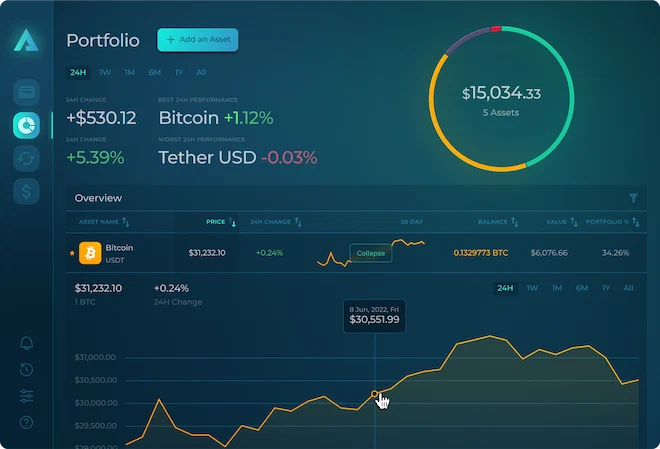Monero vs Bitcoin Comparison, Differences in Privacy and Anonymity
Feb 1, 2023As we discussed how practical blockchain explorers are in our previous article, it may concern you that the whole history of crypto transactions is put in plain sight out there as well. At least one person you’re transacting with knows who you are; and once the public key is associated with you, it’s not much of a leap to figure out connections and expose details, say, the amount you hold or earn in crypto. Through coding your identity in a string of incoherent letters and numbers, cryptocurrency addresses boast anonymity, but does anonymity equal privacy?
Blockchain developers are well aware of the privacy issue in crypto, and some strides have been made to face the challenge. In this instance, we’ll compare the two prominent blockchains — Bitcoin and Monero – with a particular focus on how they seek to protect users’ privacy.
Monero Vs Bitcoin Privacy
Monero, E-Cash For Ultimate Privacy
Monero (XMR) emerged back in 2014 as a cryptocurrency to overtake Bitcoin, which was launched without much privacy in mind. Since then, XMR gained a reputation as the most anonymous and private crypto in the market. It introduced a unique protocol different from Bitcoin focused on maximum transactional privacy without any extra effort from the users’ side.
HOW Monero Protects User Privacy
Monero introduced a complex approach to protect each and every network participant by making the crypto transaction details confidential, i.e. visible to transacting parties only. Let’s break down how exactly this privacy is achieved.
Protecting the Recipient
For all the incoming XMR operations, a user is given a stealth address – a unique one-time public key that has no connections to any other addresses in the Monero chain. This protocol feature eliminates the possibility to trace back other wallets belonging to a user as non of the keys are linked to each other.
| Outputs for a Random XMR Transaction / Source: xmrchain.net |
Ensuring the Sender’s Privacy
To completely anonymize the second party, Monero is implementing Ring Signatures. That is the technology adding 15 fake inputs to the one true input, whereby even the recipient can’t be sure which of 16 addresses is the genuine one, which makes transaction history tracking impossible.
| Ring Members of a single XMR Transaction / Source: Monero.com |
Preventing amount-based tracing
The sum of XMR transactions is also hidden by default while being visible to the recipient and sender exclusively. As long as both addresses are encrypted, there is no way to build connections and spot the addresses users control only knowing the amount.
Layered defenses
More to that, Monero is utilizing the I2P (Invisible Internet Project) protocol named Kovri, by masking the participants’ IP addresses, which completely eliminates tracebility of tokens’ origins.
Privacy Capabilities Of Bitcoin
While Bitcoin does support stealth crypto addresses, they are not enabled by default. To encrypt and hide the BTC addresses, users must perform manual settings – download dedicated software and know how to use it – making the process less user-friendly when compared to Monero's seamless implementation.
Two of these privacy-increasing tools for Bitcoin are ZeroLink and WabiSabi protocols that enable users to disguise their transactions by mixing it with others. However, this concept similar to Monero's RingCT is not as effective and not activated without additional hassle.
Bitcoin vs Monero Fungability
Asset fungibility is the monetary concept implying that all the units of any currency are treated equally, irrespective of its previous transaction history and source of origin. According to this rule, it’s nonsense to banish you from spending your salary only because the previous holder retrieved this money through illicit activity.
Similarly, it’s supposed to guarantee cryptocurrency usability regardless of where it came from. Due to Bitcoin’s inherent lack of privacy, fungibility is put at risk. With Bitcoin, you can go to block explorer, click the address and trace the origins of every coin. Some entities may abuse this feature: for instance, exchanges freeze user funds only because three transactions ago a shady activity was detected.
Privacy fixes fungibility because you cannot track a coin’s history. In this regard, Monero with its confidential transaction mechanisms can be considered a truly fungible currency unlike Bitcoin.
Monero vs Bitcoin: Scalability, and Speed
Scalability, the capability of a blockchain to handle rising transactions as activity grows, is a challenge that Bitcoin has struggled with in the past. Its limited block size often results in slow processing times and higher fees. Monero, however, has a more flexible block size designed to be scalable while remaining fast and cheap as the network expands.
Considering the time verifications take, Bitcoin is twice slower as Monero, but only on paper. While an XMR transaction takes no less than 10 confirmations and 20 minutes to be finalized, transferred BTC is generally unlocked for spending after one confirmation, which is 10 minutes on average.
Hence, Bitcoin may outperform XMR in some instances. Additionally, a Layer-2 protocol for Bitcoin, the Lightning Network, makes things even faster, by allowing small-sum transfers to be processed much speedier and cheaper. However, there are cases when a BTC transfer is pending for hours, depending on the size of a fee and how busy the network is.
Monero vs Bitcoin Fees Compared
Network fees greatly vary between the two cryptocurrencies. Bitcoin's fees tend to soar during times of high network congestion, making it an expensive mode of transaction. Monero, on the other hand, boasts of low and consistent transaction fees, unaffected by network activity.
| BTC vs XMR Average Transaction Fee Chart / Source: Bitinfocharts.com |
Network Effect Of Monero And Bitcoin
The network effect, the added value a network gains with increased usage, is a crucial aspect in determining the success of a cryptocurrency. Bitcoin has a massive, well-established network, widely accepted by merchants and exchanges as a mode of payment. This has consolidated its position as a leading cryptocurrency and has significantly contributed to its network effect.
Monero, although not as widely accepted, is gaining popularity for its ultimate anonymity features, and its network effect is growing as more people adopt it. Although its network is still smaller than Bitcoin's, Monero's growth potential is immense.
Supply And Price Difference Between Monero & Bitcoin
The total supply of a cryptocurrency refers to the number of coins that will be released to the market. Bitcoin has a limited supply of 21 million coins, with over 19 million currently in circulation. The scarcity makes BTC a highly desirable asset and causes dramatic price fluctuations and greater gains and losses.
Monero has 18.2 million coins in circulation with the max amount not fixed. Thus, XMR supplies can be increased to meet demand and potentially inflate the market. For that reason, Monero is prone to show a more stable price action over time with a steady increase in value, which is conditioned by XMR’s heavy focus on privacy making it highly popular.
Conclusion: Monero Reigns Supreme In Privacy
The core ethos of decentralization, transparency, does its job of ensuring the security of the blockchain, but simultaneously, threatens privacy. Monero is solving the issue more effectively by providing significantly stronger privacy features than Bitcoin, such as stealth addresses, Kovri protocol, and RingCT.
More to that, Monero's privacy-focused features are seamlessly integrated into the cryptocurrency's core, making it easier for users to utilize these features while providing a higher level of privacy compared to Bitcoin's optional stealth addresses. Bitcoin does have some privacy features, yet, they can’t be considered as effective or user-friendly as Monero's. For those who value privacy, Monero emerges as the clear choice over Bitcoin.
FAQ
What are the differences between Monero and Bitcoin?
Apart from being built on different protocols, XMR and BTC diverge in tokenomics, approach to scalability, fee formation model, and most of all, in solving the critical issue of privacy.
Why is Monero better than Bitcoin?
Monero’s outlook for hiding sensitive transaction details is more holistic and robust, while Bitcoin so far is only able to provide any via third-party tools. Another argument for Monero is its more democratic fees and consistent & faster operational speed in comparison to Bitcoin.
Monero is more secure than Bitcoin?
When compared to BTC, Monero is considered more privacy-oriented, hence, providing enhanced security for users.


